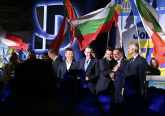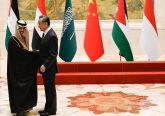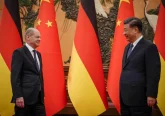
This weekend, Hong Kong, the newly declared “best city in the world”, celebrated the 15th anniversary of its return to China, and swore in its new leader, Beijing-backed Leung Chun-ying, the third Hong Kong Premier since its re-joining of the mainland. However, events that took place on Saturday and Sunday have indicated that the public mood within Hong Kong is far from universally jubilant.
While the official media has been full to the brim of Chinese nationalism-oriented elation, on the Saturday evening many residents of Hong Kong displayed their increasing anger with the actions and dictates of the parent state by protesting outside of the Convention centre where Hu Jintao was due to inaugurate Leung. Protests continued throughout the Saturday night, frequently leading to clashes between protestors and the police but were partially dispersed by the firing of vast quantities of pepper spray into the crowds.
The Chinese declared themselves surprised by the level of public outrage shown. This week’s protests, however, should not have come as a shock to the authorities. This is because they are merely another symptom of Hong Kong’s troubled relationship with its parent state and its citizens’ increasing frustration with China’s method of governing the territory.
In 1997, Hong Kong was returned to China, the hundred year lease of it to Britain having expired, upon the understanding that Hong Kong was to be treated as a “Special Administrative Region”, excluded from the oppressive laws and regulations imposed upon mainland China. However, while no attempt has been made by China to impose any sort of ‘communist’ ideology upon the successful business hub, many within the city are clearly becoming uncomfortable with the increasingly authoritarian manner to which China has approached the governorship of Hong Kong.
The method in which their new Chief Executive has been appointed is a poignant example of this problem and a source of a great deal of the ire of the protestors: elected by 689 votes from a 1,200-seat committee of business elites, the three and a half million registered voters of Hong Kong had no say over who should lead them for the next five years. Moreover, it is asserted by many that the vast majority of the committee were acting upon the wishes, articulated or otherwise, of China’s leaders. That Leung gave his inauguration speech in Mandarin and not Cantonese, the lingua franca of Hong Kong, was seen as a sign of his affiliation to Beijing.
The new Premier has also been tainted by the corruption scandals which felled Beijing’s former favourite candidate, consisting of claims of illegal extensions to houses among other allegations of sleaze. That these revelations have emerged against a background of steeply rising inequality in Hong Kong entails that they have been taken as further evidence that the system is poisonously self-serving to the business elite at the expense of the masses.
Although China has promised that Hong-Kongers may elect their own leaders by 2017, no movement has taken place to implement such a change. Indeed, such a policy is bound to look increasingly unappealing to China as dissatisfaction with the mainland grows. Fearing their once joyously-returned prize might turn into another Taiwan, the instincts of the Chinese elite will most likely be to tighten the vice on its citizens. Given China’s limited duration of guardianship of the city, such a policy is likely to be counterproductive. Old habits, however, often die hard.
Whether China is brave enough to give Hong Kong the democracy promised it will matter a great deal for Hong Kong. It shall also, however, matter for the rest of China since Hong Kong is likely to prove the first test of China’s true willingness to embrace democracy over the coming decades. As such, it is to be sincerely hoped that 2017 brings the reforms promised. Nevertheless, Hong Kong would not be well advised to hold its breath.
Kate Brooks is an Oxford MPhil student in International Relations







No Comment